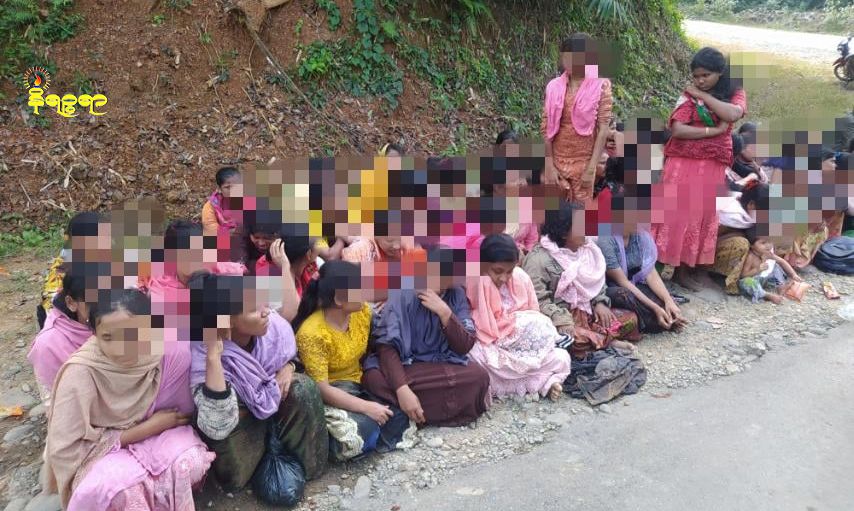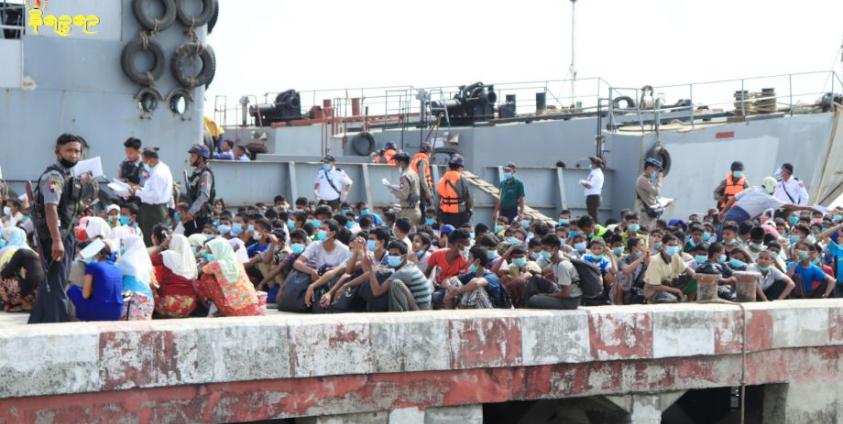The Muslim refugees who are living in Rohingya IDP (Internally displaced people) camps in Rakhine State are facing increasingly difficult circumstances in terms of their livelihood and survival. As a result, many of them are seeking to leave and migrate to other countries. Unfortunately this journey is perilous, and can result in arrests, and some of them die due to starvation.
Muslim refugees have been forced to live in IDP camps in Rakhine State for over a decade, enduring strict movement restrictions and a lack of employment opportunities, leaving them with little hope for a better future.
Due to severe restrictions on their freedom of movement, Muslim refugees living in IDP camps are resorting to undocumented migration through land and sea routes with the assistance of smugglers. Despite the risks of arrest, they hold onto the hope that their lives will improve once they reach their destination abroad, a Muslim man from Sittwe said.
“ Under the current circumstances in Rakhine State, most Muslims are not permitted to move about freely. Despite receiving 21,000 kyats from WFP each month, it is insufficient to support their livelihood. As a result, some are attempting to relocate to other areas, knowing the potential risk of arrest if they are caught. While some successfully reach their destination, a larger number are arrested midway through their journey. Despite these risks, they have decided that the possibility of death is preferable to remaining in their current situation, and are determined to leave the country. They face numerous hardships and instances of bullying here, and their freedom of movement is restricted”, he explained.

The World Food Programme (WFP) provides each Muslim refugee in the IDP camps located in Sittwe Township with 21,000 kyats per month. However, due to the high cost of living, this amount is insufficient to support their livelihoods, and they are struggling to make ends meet.
“ Because of financial constraints, I worked as a goat and cow herder. The tents in our camp are inadequate, making living conditions uncomfortable and compromising the safety of the girls”, a Muslim young adult woman from Sittwe told Narinjara.
As life in the IDP camps becomes increasingly difficult, some Muslim refugees have resorted to selling their homes and ration books to raise funds, then reach out to smugglers who charge approximately 4 million kyats per person to facilitate their migration to neighboring countries via risky routes, an official from Thea Chaung IDP camp in Sittwe Township said.
If they are intercepted during their journey, they may lose the advance payment they provided to the smugglers and could be sent back empty-handed to the IDP camps.
“Those who embark on a journey abroad face the risk of being arrested and losing their money. In some cases, they may even end up in jail and be forcibly sent back to their starting point. If they get caught, they have a lot to lose. They are often lured by smugglers who promise safe passage to their destination. While success is possible, the consequences of getting caught halfway through the journey are dire, and this risk often outweighs the potential benefits”, the camp official noted.
The Military Council has released data showing that more than 2,000 Muslim refugees who departed IDP camps in Rakhine State between December 2021 and March 2023 were arrested while attempting to reach neighboring countries.
Some Muslims who attempted to migrate were detained at checkpoints in Rakhine State, as well as in Yangon and Ayeyarwady Regions, and subsequently sent back to Rakhine State. They were later charged with violations of immigration laws and given prison sentences. In addition some Muslim refugees died of starvation while en route to their destination.
On April 20th, 2020, around 800 Muslims who were granted amnesty by the President and released from prisons were transported from Yangon to Rakhine State by navy ship. From the 800, over 600 Muslims were relocated to Sittwe, while the remaining 200 were sent to towns located in the far north near the border with Bangladesh.
Muslims living in Sittwe, Pauktaw, Myebon, and Kyaukphyu have been residing in IDP camps for a decade since the conflicts erupted in Rakhine State in 2012.
Several IDP camps have been established in the west of Sittwe Township to accommodate Muslim refugees, including Thea Chaung, Mhan Si, Say Thamar Gyi, Ohn Taw Gyi, Ohn Taw Chay, Gaung Dokkhar, Vay Du Pha, and That Ke Pyin. In addition, there are Nghet Chaung and A Naut Ye IDP camps in Pauktaw, and one IDP camp each in Myebon and Kyauk Phyu.
Narinjara attempted to contact the government of Rakhine State to ascertain the precise number of Muslim refugees residing in the camps, but was unsuccessful in establishing communication.







